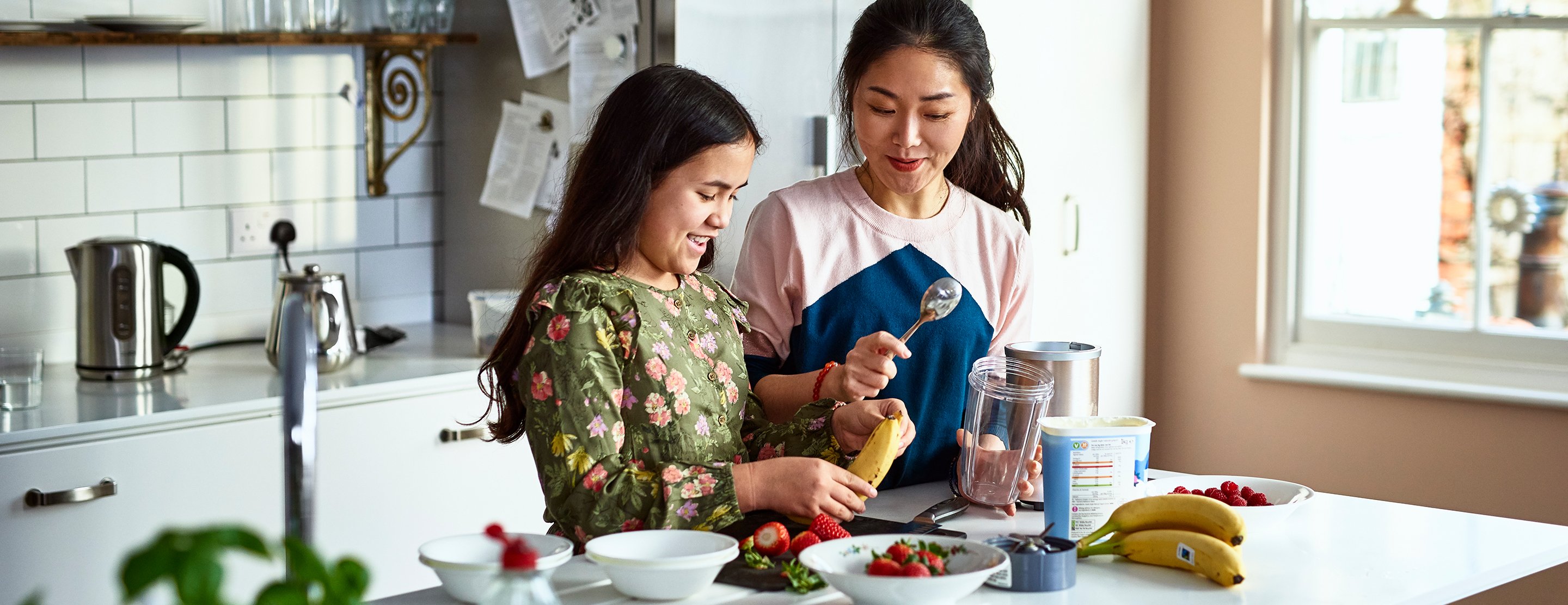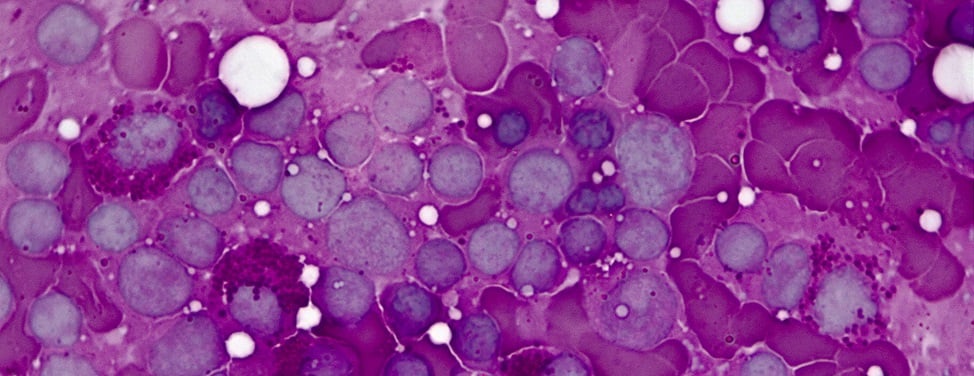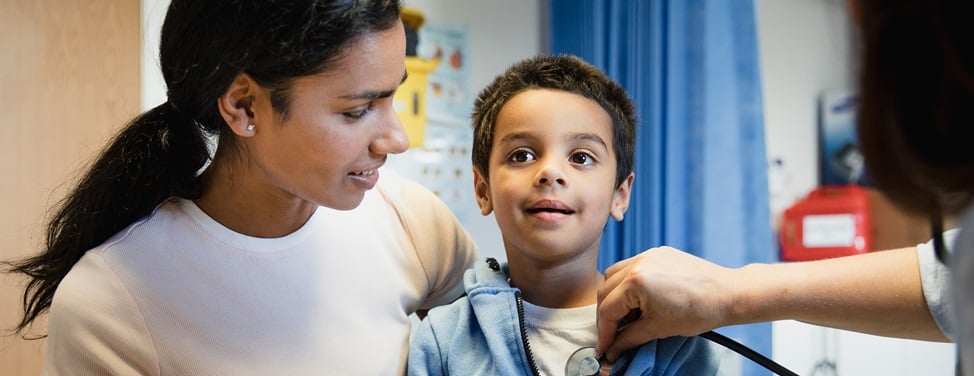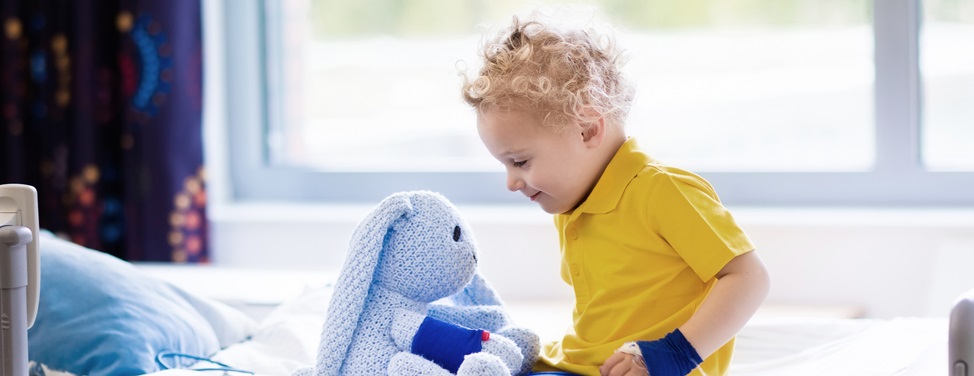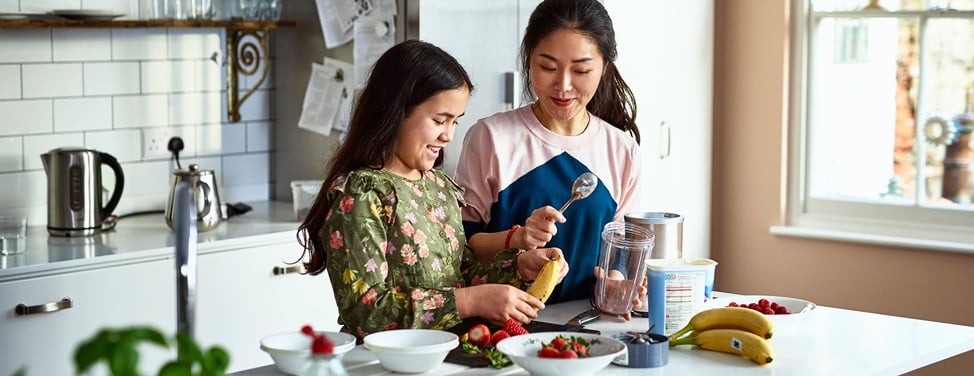The following serves as a nutrition and food safety guide for patients receiving bone marrow or stem cell transplants at UCSF Benioff Children's Hospital:
General information:
Patients who have a weakened immune system are at risk for food-borne illness. The most important factor to decrease the risk of food-borne illness is food safety.
Non-hospitalized, neutropenic patients should follow the guidelines for food safety below, avoid high risk foods and discuss concerns with their outpatient dietitian, physician, nurse practitioner or nurse.
Food preparation and safety:
The following general practices are recommended for home food preparation:
- Keep shelves, counter tops, refrigerators, freezers, utensils, sponges, towels, and other kitchen items clean. Using a dishwasher is a good way to clean utensils, cutting boards and sponges.
- The food preparer should be healthy, without signs of infection (such as runny nose or cough).
- Before preparing foods, wash hands thoroughly using warm, soapy water.
Food storage:
- Foods should be eaten soon after preparation. Use caution if transporting food.
- Cold foods need to be stored at less than 40 degrees Fahrenheit and hot foods need to be kept at greater than 140 degrees Fahrenheit.
- Reheat leftovers to greater than or equal to 165 degrees Fahrenheit (use caution with microwaves due to uneven heating).
- Perishable food stored at room temperature for more than two hours should be discarded.
- Per hospital policy, refrigerated foods must be labeled, dated and eaten or discarded within 24 hours.
Meat, poultry, eggs, and seafood:
- Wash hands after handling raw meats and before preparing other foods.
- Handle raw meats, poultry, eggs and fish away from other food items.
- Thaw frozen foods in the refrigerator only, never at room temperature.
- Only buy eggs that are refrigerated. Avoid cracked eggs and don't wash the outside of eggs before you store them (they have a natural protective coating). Do not eat raw or under cooked eggs (Yolks and white should both be firm).
Fruits and vegetables:
- All fresh fruits and vegetables should be washed thoroughly prior to eating, peeling, or cooking. This includes organic or homegrown produce.
- Keep fresh produce away from raw meats, poultry, and seafood products. Use separate cutting boards for fresh produce and raw meats, poultry and seafood.
- Cut away any damaged or bruised areas on fresh fruit and vegetables.
- Scrub firm produce, such as melons and potatoes, with a clean produce brush.
- Drying produce with a clean towel or a paper towel can help reduce bacteria.
- Washing produce with soap, detergent, or commercial produce washes is not recommended.
- Many pre-cut bagged produce items are pre-washed, but can be re-washed as an extra precaution.
- Do not eat raw vegetable sprouts. Washing them will not remove bacteria.
Miscellaneous:
- No rice from outside of the hospital is allowed. Rice in frozen entrees and rice from the patient food services menu is okay.
- Small cooking appliances are not allowed in patient rooms or on the patient floor due to our hospital fire code.
- Symptoms of food-borne illness include nausea, vomiting, diarrhea and fever.
Water and other beverages:
Miscellaneous:
- In general, tap water is safe for drinking in the United States. Water from private wells is not recommended unless it has been evaluated for bacterial contamination.
- Bottled water is considered safe if one of three processes is done: 1) reverse osmosis 2) distillation, or 3) 1-microgram particulate absolute filtration. To confirm that your usual bottled water has undergone one of these processes, you should contact the bottler directly. Bottled water from the hospital is safe.
- Coffee, tea, and other hot beverages from a safe water source are okay.
- Nationally distributed soft drinks and pasteurized fruit juices are considered safe.
Restaurant foods:
- In general, eating foods from restaurants or other establishments that serve food is discouraged due to inability to ensure food safety.
- Always use your best judgment when choosing a restaurant. Many restaurants post their inspection scores: the higher the score, the safer the restaurant.
- Avoid food from salad bars, public self-serve condiments (for example, salsa) self-serve buffets and foods held in a warming containers.
- Ask for your food to be made fresh, and use single serving condiment packages.
- Avoid fountain beverages and ice from ice machines.
- Make sure transport time is less than one hour and try to keep hot foods hot and cold foods cold (i.e. using insulated carry containers or coolers). It may be a good idea to re-heat foods prior to serving.
- Avoid raw fruits and vegetables when getting foods from restaurants. Serve these foods at home where you can wash them thoroughly.
Food safety resources:
- FDA: Center for Food Safety (www.cfsan.fda.gov) or 1-800-532-4440.
- USDA: Food Safety for Transplant Recipients (www.fsis.usda.gov/PDF/Food_Safety_for_Transplant_Recipients.pdf)
- Centers for Disease Control and Prevention (www.cdc.gov/foodsafety) or 1-888-232-3228.
Foods that pose a high risk:
- The table below was adapted from the Centers for Disease Control guidelines for stem cell transplant.
- Autologous Stem Cell Transplant: The diet guidelines below are recommended for three months after transplant.
- Allogeneic Stem Cell Transplant: Ask your physician when it is okay to liberalize this diet. Typically, it is liberalized six to nine months post-transplant.
| Foods that pose a high risk | Safer substitutions |
| Raw and undercooked eggs and foods containing them (for example, French toast, omelettes, salad dressings, eggnog, and puddings) | Pasteurized or hard boiled eggs |
| Unpasteurized dairy products (for example, milk, cheese, cream, butter, and yogurt) | Pasteurized dairy products |
| Fresh-squeezed, unpasteurized fruit and vegetable juices | Pasteurized juices |
| Unpasteurized cheeses or cheeses containing molds | Pasteurized cheeses |
| Undercooked or raw poultry, meats, fish, and seafood | Cooked poultry, well-done meats, cooked fish, and seafood |
| Raw or lightly cooked vegetable sprouts (for example, alfalfa, bean, and other seed sprouts) | Sprouts should be washed and well-cooked |
| Raw fruits with a rough texture (for example, raspberries) | Should be avoided |
| Unwashed, smooth raw fruits | Should be washed under running water, peeled, or cooked |
| Unwashed raw vegetables | Should be washed under running water, peeled, or cooked |
| Undercooked or raw tofu | Cooked tofu |
| Raw or unpasteurized honey | Should be avoided |
| Uncooked hot dogs and food from deli slicers | Should be avoided unless further cooked |
| Raw, uncooked grain products | Cooked grain products including bread, cooked, and ready-to-eat cold cereal, pretzels, popcorn, potato chips, corn chips, tortilla chips, cooked pasta, and rice |
| Maté tea | Should be avoided |
| All moldy and outdated food products | Should be avoided |
| Unpasteurized beer (e.g., home-brewed and certain microbrewery brew) | Pasteurized beer (for example, retail bottled or canned, or draft beer that has been pasteurized after fermentation) |
| Raw, uncooked brewers yeast | Should be avoided; HSCT recipients should avoid any contact with raw yeast (for example, they should not make bread products themselves) |
| Unroasted raw nuts | Cooked nuts |
| Roasted nuts in the shell | Canned or bottled roasted nuts or nuts in baked products |
General nutrition
Adequate nutrition is an important part of the recovery process. It helps protect the body from infection and repair the tissue damage caused by preparative chemotherapy or radiation therapy.
Calcium, vitamin D and phosphorus: Some medications (mainly corticosteroids) can compromise bone health. Good nutritional status, weight bearing exercise, and adequate calcium, vitamin D and phosphorus will help to build strong bones.
Potassium and magnesium: Certain medications, or diarrhea and vomiting can cause electrolyte imbalances. Potassium and magnesium are important for proper nerve function and muscle control. Magnesium also aids in bone growth and metabolism. Even after discharge from the hospital, it is common to require potassium and magnesium supplementation. This will be given by pill or intravenous infusion, and it can also be obtained through the food sources listed below.
| Calcium | Vitamin D | Phosphorus | Potassium | Magnesium |
| milk/buttermilk | fortified milk | bran cereal | baked potato/yam | bran cereal |
| yogurt/yogurt drink | salmon | cornbread | dried apricots/raisins | brown rice |
| broccoli/spinach | fortified cereals | beans | sole/halibut/salmon | beans |
| hard cheese | sardines | black-eyed peas | bran cereal | tofu |
| dried figs | egg yolk | chocolate | avocado/tomato | sunflower seeds |
| calcium set tofu | liver | yogurt | banana/mango | almonds/cashews |
| whole sesame seeds | herring | milk/cheese/soy milk | steak/poultry | spinach/chard |
| salmon/mackerel | cod-liver oil | walnuts/almonds | beans (pinto, lima) | avocado |
| molasses, blackstrap | sunlight | sardines/salmon | milk/yogurt | dried figs |
Sodium: Corticosteroids — such as prednisone, tacrolimus (Prograf), or cyclosporine (Neoral) may cause fluid retention, edema, and hypertension. Avoiding excess sodium can help decrease those side effects. Processed and canned foods are often high in sodium.
Vitamins and minerals: A well-balanced diet will usually provide 100% of the recommended nutrients. A daily multivitamin may be a good idea after leaving the hospital. Blood transfusions (red blood cells) provide a lot of iron so it may be necessary to avoid additional iron supplementation if many transfusions are required. If you have questions regarding a multivitamin product, contact your dietitian or bring your labeled vitamin bottle to your next appointment for doctor's approval.
Lactose: Some patients may develop a temporary intolerance to lactose during their treatment course, which may result in diarrhea or abdominal cramping. If this occurs, a lactose-free diet may be followed.
Foods high in lactose include milk, milk-based products or sauces, cottage cheese, powdered dry milk, evaporated milk, yogurt, ice cream, and puddings or custards made with milk. These foods should be avoided or eaten only in small amounts, then re-introduced slowly as side effects of treatment resolve.
Low-lactose and lactose-free foods include sorbet, cheese, broth-based soups, breads and rolls that are not made with milk or milk solids, cereals, fruits and plain vegetables, tofu, non-dairy creamers, meats and peanut butter. These foods may be eaten anytime in usual quantities. Yogurt is usually well-tolerated. Lactaid or Lactose-free milk may be used to replace milk. Lactaid pills are available over-the-counter and may help digest milk products.
Protein and calories: During illness and treatment the body requires a higher amount of calories and protein than usual. Meeting nutritional needs can be especially challenging when dealing with side effects such as nausea, vomiting, diarrhea, constipation, taste changes, dry or sore mouth and poor appetite. The nutrition assistant or dietitian is available to discuss strategies for increasing intake in the hospital.
Nutritional supplements: Supplements like Pediasure, Boost Kids Essentials, Vital Jr, Peptamen Jr, Nutren Jr, Carnation Instant Breakfast, Boost, Boost Breeze, Ensure, Enlive and Scandishakes are a good way to increase calorie and protein intake. Ask your dietitian for specific recommendations.
Alternative and complementary therapies: It is very important to speak with your physician and pharmacist before trying any type of herbal supplement or tincture. These supplements may interfere with other medications or therapies and can be harmful.
Contact your physician or dietitian if you have further questions.
Other resources:
- UCSF Helen Diller Family Comprehensive Cancer Center (415-502-5547)
- National Cancer Institute (1-800-4-CANCER)
- American Cancer Society (1-800-ACS-2345)
- Cancer Care (1-800-813-HOPE)
- NIH Office of Dietary Supplements (1-301-435-2920)
- American Dietetic Association (1-800-366-1655)




























